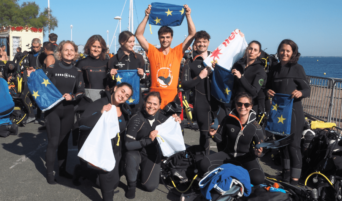Citizen science against plastic pollution!
Awareness and education
Science
19 October 2023
Ocean plastic pollution is a relatively recent phenomenon, and scientific research into it is still in its infancy. Contributing to global knowledge is imperative to better combat this ecological disaster. That's why The SeaCleaners has placed science at the heart of its mission. To coincide with the Fête de la Science, the association is launching its citizen science program, with the aim of contributing to global knowledge and involving all citizens in the process. Lets have a look!

Citizen science at The SeaCleaners, for whom and for what?
Thanks to citizen science, everyone – specialists and amateurs alike – can help science move forward!
Citizen science enables citizens to help researchers, by enriching their data and knowledge. Since 2016, The SeaCleaners and its many volunteers and partners have been involved in waste collection actions on land, in cities, on beaches or in the countryside. The data and results of these collections can become a real goldmine for research and decision-makers, to better understand and act at the source of plastic pollution.
The challenge is to process reliable data. To achieve this, data must be collected according to a strict, validated and shared protocol. Comparable data is what makes participatory science programs so valuable, as our scientific manager Gwenaële COAT explained at the 7th International Conference on Marine Debris.
Sharing data is the key!
The Zéro Déchet Sauvage platform and our partnership with MerTerre
To this end, The SeaCleaners is now a partner of the MerTerre association, developer of the Zéro Déchet Sauvage citizen science platform.
MerTerre develops methods for characterising diffuse abandoned waste in all types of environment, and coordinates several collaborative science platforms.
The data collected during The SeaCleaners cleanups will therefore be regularly added to the Zéro Déchet Sauvage platform, which compiles information on pickups, and provides several protocols and training tools. The platform is a reference on the subject in France and Europe.

It will then be possible to analyze the type of waste found, the flows, the areas of accumulation, to compare areas with each other and to see the evolution of waste in the same area over time. These analyses will be accessible to all via “data visualizations” available on the platform. A formidable public policy tool that enables decision-makers to implement waste reduction policies adapted to the reality of their territory!
We're launching the program during the Fête de la Science
For the past 3 years, the Fête de la Science has been a highlight in The SeaCleaners calendar. The 2023 edition, which takes place from October 6 to 16 in mainland France, and from November 10 to 27 internationally and overseas, offers the ideal opportunity to widely promote the new citizen science program.
- We’re launching The SeaCleaners Citizen Science Backpack, which contains everything you need to properly collect and characterise waste: pairs of gloves, tape, scissors, tarpaulin, characterisation signs, solid coloured collection bags for differentiated sorting, infographics, manuals, etc. These materials are made available to volunteer cleanup organizers.

- An event for the general audience took place on October 7 and 8 at the BioLab of the Cité des Sciences et de l’Industrie, with family workshops, to preview our new animation: Détective Plastique, l’investigation anti-pollution plastique. It’s an exciting Cluedo game to help you understand participatory science while having fun, and stop the “Serial Polluter” of the oceans – plastic waste. Autopsy, crime scene, re-enactment…: this fun activity will be added to The SeaCleaners catalog and offered as part of our awareness-raising operations.
- A pilot waste collection operation organized by the GASP (The SeaCleaners’Participatory Science Action Group) took place on October 8, with a diving waste collection in the Biganos green lake (alongside the giant underwater waste collection carried out with NSA and a land waste collection to understand the land/sea/urban environment continuum).

- For schools and extracurricular centers, citizen science activity sheets, aimed at secondary school pupils (cycles 3 and 4) and high school students, are now available in our Teachers’ Area. During these activities, students will be able to practice the scientific approach by collecting waste according to a protocol they have devised, and then analyzing the data collected.
- A conference on citizen science will be held in La Seyne-sur-Mer on October 21 at 6:30 p.m. aboard the legendary Belem, hosted by Gwenaële Coat, scientific manager of The SeaCleaners, with Isabelle Poitou, managing director of MerTerre. To register, contact m.mallin@theseacleaners.org
Would you like to get involved in the Citizen Science movement as a volunteer? Contact GASP at gasp@theseacleaners.org
